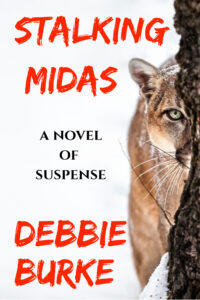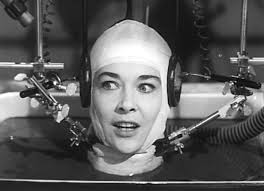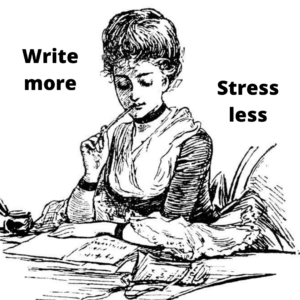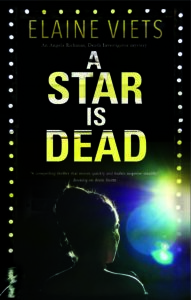
Photo credit: jessie daniella – Unsplash
By Debbie Burke
@burke_writer
Welcome to today’s Brave Author who submitted a first page entitled Closure.
TKZ’s intrepid website wrangler, Lynne, included a note with this submission that the prologue occurs nearly two months after Chapter 1. That means the scene below is actually a flash forward, not a prologue, something to keep in mind as you read the submission. Please enjoy and we’ll discuss it on the other side.
Prologue
Sunday, December 31st 9:19 PM
There was nowhere to run now.
Her head throbbed by now. The agony blurred her vision as blood poured from the nasty gash just above her eye.
She cared little about that now.
Girl get it together, she thought to herself as she dragged her body—uncooperative legs and all—from behind a corner trash bin to the underside of the rusted stairwell.
“No one will find you, Reverend Sinclair. It’s New Year’s Eve. And you’re about to die.”
The rush of pain exploded with every dreaded movement.
The hell I will, she thought, steeling her mind against the expectation of excruciating pain. Her legs barely cooperated thanks to her foe’s quick thinking and lead pipe. As she dragged herself from one corner to the next, she suddenly spied an old vent partially covered by plywood.
“It’s over, Reverend Sinclair. It’s finally over,” the faceless voice bellowed.
She opened her mouth, her mind searching for a retort. Nothing came out. She needed to squeeze into that vent and in a hurry. Somehow, grinding her teeth and clinching her bloodied fists, she managed to dislodge the board enough to squeeze through.
Every prayer she ever heard her grandmother pray ran through her mind. She should have left things alone.
Then again, she couldn’t. She was never one for that. Like sirens from a distant sea, the “things” had beckoned her, lured her into a whirlwind of unimaginable danger. Her phone fell out when she bolted through the warehouse from the menace. Her bloodied knuckles, overworked from trying to take out a creaky door, prevented her from wiping the muddled mess from her cheeks. Life had already stolen so much from her to begin with. Did she really have anything to lose at this point?
“My God,” she whispered, tears rolling down her face in a mingle of blood and dust from her secret abode. Her body sore and her eyes heavy, Venus longed for rest. Only a flash of light through the crack of the board gave her hope.
“Light? Who is that?” she posited under her breath with a faint smile. Hope flickered enough to dull the pain that shot from her left knee as she leaned closer to the peak through the splintered plywood.
“Thank you, Jesus…”
Her smile faded quickly when the answer to her question resounded with a crushing rejoinder.
Fire.
~~~
At TKZ, we encourage starting with action right off the bat and Brave Author has certainly done that. A woman named Reverend Venus Sinclair is fleeing from someone who has already caused her serious injury with a lead pipe and intends to murder her. A female cleric is an unusual and interesting character, not a typical protagonist. The premise that someone is trying to kill a woman of God is shocking and grabs a reader’s attention immediately. Well done!
There’s lots of vivid sensory detail—blood pouring from a nasty gash over her eye, legs weak and uncooperative because of intense pain, bloodied knuckles. The reader feels Venus’s agony and desperation as she scrambles to find a hiding place to escape her attacker.
So far so good.
But…action without context can be confusing and frustrating to readers. In this case, there’s too much excitement and not enough explanation.
It appears the author is starting at the brink of the story’s climax then intends to double back to the events that led to this point of crisis.
If that is the author’s intention, this page is not a prologue but rather a flash forward.
A prologue is a scene that happens before the current story begins.
A flash forward, or prolepsis if you want to sound really literary, happens in the future to foreshadow events that have not yet unfolded in the story. Here’s an explanation from k12reader.com:
A flash forward, on the other hand, is when some event that has yet to happen in the present narrative time intrudes. A flash forward are [sic] like foreshadowing in that both provide clues as to what will happen later on in a story. But foreshadowing gives only an impressionistic sense of future events, while a flash forward shows the reader or viewer exactly what the future holds in store, even though the reader may not have enough information to make sense of this detail yet. Sometimes, a flash forward is nothing more than an opening line that reveals a major event in the future. “In a week’s time, the Thomas family will be dead.”
I suggest the author delete the word “Prologue” and simply use date stamps to indicate time sequence.
Now let’s dig in to the writing. The main problems are overwriting, repetition, and lack of clarity.
There was nowhere to run now. – This is a decent opening line but now is used three times in three sentences. Suggest you cut the last two.
Cut repetitive descriptions of her injuries to leave more room for important context and setting information. You don’t need both throbbed and agony.
Her head throbbed, by now. The agony blurred blurring her vision as blood poured from the nasty gash just above her eye.
She cared little about that now. Show this with her actions instead of telling.
Girl, get it together – take this opportunity to introduce her name. Venus, get it together.
Italics makes it clear she’s thinking. Delete she thought to herself.
uncooperative legs and legs barely cooperated are repetitious. The crucial point here is the attacker is armed with a lead pipe and has disabled her. Emphasize that.
from behind a corner trash bin to the underside of the rusted stairwell. – This is the first hint of where the scene is taking place but more detail would help ground the reader. I can’t visualize where she is. Is it a deserted alley behind her apartment building? The dark parking lot of her church? Withholding the location doesn’t increase tension but instead causes disorientation.
“No one will find you, Reverend Sinclair. It’s New Year’s Eve. And you’re about to die.” Another strong line but, without attribution, it’s confusing. Who’s talking? You don’t necessarily have to reveal the person’s identity. Presumably that’s meant to come as a surprise revelation for the climax. But specify if the voice is male or female.
The rush of pain exploded with every dreaded movement and the expectation of excruciating pain are repetitive.
There’s a corner trash bin followed by she dragged herself from one corner to the next. More repetition plus it’s unclear—the corner of what? The trash bin? A building? A city block? Be specific so the reader can visualize where the action is taking place.
The hell I will is another strong line that shows her personality and determination.
she suddenly spied an old vent partially covered by plywood. Need more detail. How big is the vent? Large enough to crawl through? Where does it lead to? Into the basement of a warehouse? A restaurant? Her church?
“It’s over, Reverend Sinclair. It’s finally over,” the faceless voice bellowed. Good line. The reader wants to find out what it is.
She opened her mouth, her mind searching for a retort. Nothing came out. She needed to squeeze into that vent and in a hurry. Somehow, grinding her teeth and clinching her bloodied fists, she managed to dislodge the board enough to squeeze through. Clench not clinch. More overwriting. Instead of having her think about what she’s going to do, go directly to the action. Her reasons are clear to the reader.
An alternative: She longed to shout a retort but that would give away her position. Instead, she clenched her teeth and yanked at the plywood with bloodied fingers. It barely moved but allowed her to squeeze inside, out of sight.
Every prayer she ever heard her grandmother pray ran through her mind. She should have left things alone.
Then again, she couldn’t. She was never one for that. Like sirens from a distant sea, the “things” had beckoned her, lured her into a whirlwind of unimaginable danger. These sentences bring the action to a dead stop. Plus they’re distracting. Sirens from a distant sea – this simile adds no meaningful context and further disorients the reader.
Condense her thoughts to the bare minimum like: Her grandmother’s prayers ran through her mind. She should have left things alone. But she couldn’t.
Her phone fell out – From her jeans? The pocket of her communion robes? Use this opportunity to further describe Venus’s appearance. Does she retrieve the phone? Why doesn’t she use it to call for help?
when she bolted through the warehouse from the menace. At last, a specific location is named—a warehouse. Add a couple of words of description. Is it vacant and echoing? Floor-to-ceiling shelves full of auto parts she can hide behind?
Bolted doesn’t ring true when, a second before, she was so crippled she had to drag herself.
Her bloodied knuckles, overworked from trying to take out a creaky door, prevented her from wiping the muddled mess from her cheeks. Delete repetitive description of her injuries. Would she really worry about wiping her face now?
Instead, concentrate on the creaky door. Creaky implies she tries to open it but you never show that. Where is the door? On the other side of the warehouse? Is it locked? Is it an escape or a dead end?
Life had already stolen so much from her to begin with. Did she really have anything to lose at this point? Again, these thoughts stop the action yet don’t reveal anything about why she’s now in this precarious position. Suggest you either delete these two sentences or add an intriguing detail that makes the reader curious.
Possibility: She’d lost her congregation and family. She had to prove her innocence before this maniac killed her.
“My God,” she whispered, tears rolling down her face in a mingle of blood and dust from her secret abode. Her body sore and her eyes heavy, Venus longed for rest. Introduce her first name, Venus, earlier in the page. Delete repetitious description and focus on her silent, desperate call to God for help.
Only a flash of light through the crack of the board gave her hope. Another potentially strong line but confusing. A few sentences ago, she bolted, implying she ran and is now farther away from the vent she crawled through. Is the board the same plywood she pushed aside? Or is it part of the creaky door? You need to clear this up.
“Light? Who is that?” she posited under her breath with a faint smile. Posited is a pretentious word that doesn’t belong. She wouldn’t speak out loud, even under her breath, and give away her position. Since she doesn’t know the source of the light, her reaction seems unrealistic because it’s more likely to be the attacker than, say, a rescuer with a flashlight.
Hope flickered enough to dull the pain that shot from her left knee as she leaned closer to the peak through the splintered plywood. Delete extra the. Peak should be peek. I’m totally confused where she is now. Didn’t she bolt across the warehouse? Did she return to the plywood-covered vent? Or did she never leave there?
“Thank you, Jesus…” Good line but you need to give a plausible reason why she believes she’s now safe. Does she hear police sirens?
Her smile faded quickly when the answer to her question resounded with a crushing rejoinder. More overwriting. Resounded and rejoinder are jarring words that draw attention to themselves. Suggest you delete the entire line. Instead, focus on her brief instant of hope that’s immediately dashed.
Fire. Excellent scary development. If her pursuer can’t beat her to death with the lead pipe, he’ll burn down her hiding place. That’s great tension. But, again, it stretches plausibility unless you show that she’s cornered and trapped. Otherwise, presumably she would have time to escape out the other side of the warehouse.
Overview:
Focus on painting a crystal-clear picture of the scene. You don’t need long descriptions but be sure the reader can visualize the alley (I’m presuming it’s an alley but still am not sure), the vent in the warehouse wall, and the inside of the warehouse. You mention the underside of the rusted stairwell. That is a good example of the type of specific detail I’m suggesting.
Establish her injuries right away. Example: She dragged her left leg, useless since the attacker had smashed the knee with a lead pipe. Blood from the nasty gash on her forehead obscured her sight. She wiped her eyes with bruised knuckles.
Then move on. The reader knows she’s seriously injured without constant, repetitive reminders of her pain.
Clarify Venus’s position and the choreography of her movements. When she’s outside, she’s dragging herself on the ground. Then she crawls through the vent. Once she’s inside the warehouse, show her movements so the reader can visualize exactly what she’s doing. Does she crawl? Stand up? Bolt?
Watch out for plausibility problems mentioned above. Is the scenario realistic? Are her thoughts and actions believable?
The title, Closure, is vague and general. If you work on using specific details in the story, you can probably find a stronger title.
Brave Author, once you clean up the writing and improve the clarity, I would like to read more about Reverend Venus and how she got into this life-or-death situation.
~~~
TKZers: I’ll be traveling all day and won’t be able to comment until later. Meanwhile, can you offer any suggestions to help out our Brave Author?
~~~

HAPPY ST. PATRICK’S DAY! Celebrate with a green beer and a FREE copy of STALKING MIDAS!


















